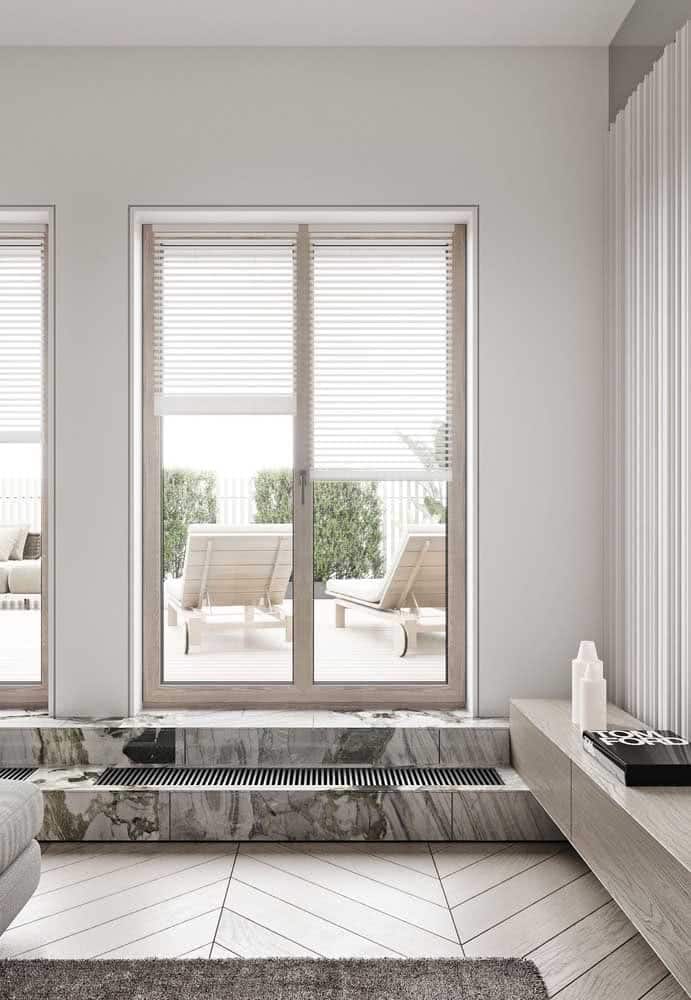Looks like it, but it isn’t! Marbled porcelain tile has this incredible ability to distract the unsuspecting, faithfully reproducing all the characteristics of natural marble. In other words, it is possible to combine the beauty of marble with all the benefits that porcelain tiles have to offer.
Want to better understand this story? So come with us to this post and find out why marbled porcelain should be part of your project.


Marbled porcelain is a type of porcelain, like all others, the difference is in the pattern of textures and colors stamped on the surface of the floor. This is because this type of porcelain tile very perfectly reproduces the characteristic colors and veins of marble, giving the impression that it is really a natural stone. Nowadays it is possible to find marbled porcelain tiles in different color options, such as white, black, beige, and gray.
Large, rectified pieces, with sizes between 90×90 and 1.20x 1.20m, add even more value to marbled porcelain tiles, since grout marks practically no longer exist or are very discreet. The marbled porcelain tile can still be chosen according to the type of marble you want. Some brands are dedicated to producing pieces that faithfully reproduce very famous and coveted marbles, such as Carrara, for example.
You must be wondering why, after all, changing from marble to porcelain, isn’t it? Because we here give you some good reasons for that, follow:
One of the great advantages of marbled porcelain over marble is its scratch resistance. This is because marble is, by nature, a porous material that can be easily scratched by the friction of furniture and shoes. Porcelain tiles, on the other hand, do not have this problem, as their surface is more rigid.
Believe me, marbled porcelain is more durable and resistant than marble. This is thanks to the hardness scale, a standard measure that determines how hard material can be.
On this scale, called the Mohs Scale, marble has a hardness degree between 3 and 4, with 10 being the indication of material with greater hardness and 1 for materials with less hardness. Just to give you an idea, a kitchen knife or a coin is enough to scratch the marble. The porcelain tile has a hardness degree of 5 for the polished models and 7 to 9 for the natural finish versions.
Unlike marble, porcelain is a type of waterproof ceramic floor, that is, both water and other liquids are not absorbed. This means that the possibility of the floor staining is practically zero.
Marbled porcelain tiles are also easier to clean. As it is a material that is more resistant to scratches and stains, you do not need to worry about using specific cleaning products. You can use a broom, vacuum, wet cloth, and even wash.
This is perhaps the main reason why you became interested in marbled porcelain tiles. And no less.
The price difference between marble and porcelain is significant. While marble can reach values between 900 and R$ 1200 per square meter, marbled porcelain tiles will cost between R$ 200 and R$ 600 per meter, depending on the brand, pattern, and size of the pieces.
Another advantage of marbled porcelain tiles is that it allows for future works and renovations to be carried out without major inconvenience. That’s because the pieces are glued individually, while the marble is installed in large, continuous pieces. In other words, if you need to break just one piece, you will have to remove the entire slab, with the porcelain tile you just need to remove one piece.
The high technology used today makes the marbled porcelain tiles a faithful and realistic copy of the natural marble stones. In some cases, it is virtually impossible to tell the difference. But for this, it is important to look for quality brands.
Marble extraction is a very harmful process for the environment, causing the devastation of native forest areas, river contamination, and soil damage. Therefore, even if the porcelain tile is not the most sustainable floor there is, this ends up being a more ecological option.
Check out these 9 projects that have invested in the use of marbled porcelain tile below and get inspired:
1.
2.
3.
4.
5.
6.
7.
8.
9.
This website uses cookies.